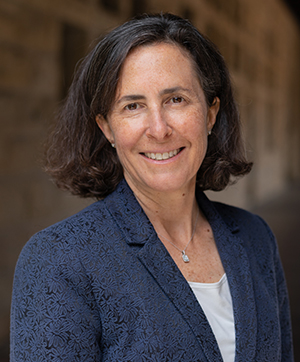
Stacey F. Bent
Stanford University
Vice Provost, Graduate Edu & Postdoc Affairs, Jagdeep & Roshni Singh Professor in the School of Engineering, Professor of Energy Science Eng, Sr Fellow at Precourt & Professor, by courtesy, of Electrical Eng, Materials Sci Eng & Chemistry
Precise Materials Synthesis One Layer at a Time:
Toward Catalysis and Energy Storage
Monday, May 20, 2024 | 11:30–12:20 p.m. PDT | Bagley (BAG) 261
Abstract
With the intensifying global need for alternative energy and fuels, there is strong interest in the development of efficient catalysts that can drive the chemical conversion of renewable resources into useful products, as well as electrochemical systems for energy storage. Due to the central role that interfaces have in both catalytic and electrochemical systems, it is critical to engineer and control these interfaces. This talk will describe our research on layer-by-layer synthetic strategies, namely atomic layer deposition (ALD), to engineer thin film materials used at interfaces in catalysts and batteries with a high level of control over composition, structure, and thickness. We study the conversion of syngas to synthetic liquid fuels and high-value chemicals using supported metal, heterogeneous catalysts. Atomically precise ALD titration of additive components onto the supported metal catalysts for syngas conversion allows for the tuning of activity and selectivity and provides new insights into structure-property relationships in these systems. We also use ALD interfacial layers deposited on the current collector as a new strategy to control lithium metal morphology and improve electrochemical performance in Li metal batteries. Ultrathin metal oxide films deposited by ALD on the current collector of lithium anodes generate surface layers with specific electrical or chemical properties that enable uniform and reversible Li plating, leading in turn to improvements in battery cyclability. The potential of ALD to synthesize nanoscale materials and engineer interfaces for energy applications will be discussed.
Bio
Stacey F. Bent is the Jagdeep and Roshni Singh Professor at Stanford University, where she is Professor of Chemical Engineering, Professor of Energy Science and Engineering, and Professor, by courtesy, of Chemistry, of Materials Science and Engineering, and of Electrical Engineering. She also currently serves as Vice Provost for Graduate Education and Postdoctoral Affairs. Bent obtained her B.S. degree in chemical engineering from UC Berkeley and her Ph.D. degree in chemistry from Stanford, and she was a postdoctoral fellow at AT&T Bell Laboratories. Bent’s research interests are in the understanding of surface chemistry and materials synthesis and the application of this knowledge to a variety of problems in sustainable energy, semiconductor processing, and nanotechnology. Bent was elected to the U.S. National Academy of Engineering in 2020. She is also a Fellow of the American Chemical Society (ACS) and the American Vacuum Society (AVS). She is the recipient of the 2018 ACS Award in Surface Chemistry, the 2020 SRC Technical Excellence Award, and the 2021 ALD Innovator Award, the highest recognition in the ALD community. In 2021, she also was honored with the Braskem Award for Excellence in Materials Engineering and Science from AIChE.
Past Lectures

2023 SPEAKER
Cato T. Laurencin
University of Connecticut
University Professor and Albert and Wilda Van Dusen Distinguished Endowed Professor; CEO of the Cato T. Laurencin Institute for Regenerative Engineering
Regenerative Engineering: Chemistry and Materials Science in Regeneration

2022 SPEAKER
Zhenan Bao
Stanford University
K.K. Lee Professor and Department Chair in the Department of Chemical Engineering; Courtesy Professor in the Department of Chemistry and Department of Materials Science and Engineering; Director, Stanford Wearable Electronics Initiative (eWEAR)
Skin-Inspired Organic Electronics

2020 SPEAKER
Sharon C. Glotzer
University of Michigan
Anthony C. Lembke Department Chair of Chemical Engineering; Professor of Materials Science and Engineering; John W. Cahn Distinguished University Professor of Engineering; Stuart W. Churchill Collegiate Professor of Chemical Engineering
Engineering Colloidal Matter, Assembly Pathways and the Entropic Bond

2019 SPEAKER
Gregory Stephanopoulos
Massachusetts Institute of Technology
W. H. Dow Professor of Chemical Engineering and Biotechnology
Engineering Microbes for the Production of Isoprenoid Compounds

2018 SPEAKER
Sang Yup Lee
Korea Advanced Institute of Science and Technology
Distinguished Professor of Chemical and Biomolecular Engineering